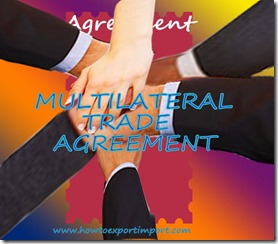The information provided here is part of Import Export online Training
Multilateral trade agreements
In this article, the information about multilateral trade agreement is explained. What do you mean by multilateral trade agreement? How does multilateral trade agreement work? What is the importance of multilateral trade agreements in world trade scenario?
 Multilateral trade agreements are made between two or more countries to strengthen economy of member countries by exchanging of goods and services among them. The multilateral trade agreement builds commercial relationship, trade facilitation and financial investments among member countries of such multilateral trade agreement. Compared to bilateral trade agreement, multilateral trade agreements are difficult in negotiation of agreement, as more member countries are involved in multilateral trade agreements. Up to the level of norms in multilateral trade agreement, the member countries are treated equally.
Multilateral trade agreements are made between two or more countries to strengthen economy of member countries by exchanging of goods and services among them. The multilateral trade agreement builds commercial relationship, trade facilitation and financial investments among member countries of such multilateral trade agreement. Compared to bilateral trade agreement, multilateral trade agreements are difficult in negotiation of agreement, as more member countries are involved in multilateral trade agreements. Up to the level of norms in multilateral trade agreement, the member countries are treated equally.
The multilateral trade agreements can be formed in regional basis also. There are many multilateral trade agreements between countries worldwide regionally for the development of economy of each member countries signed in each multilateral trade agreement. SAARC (South Asian Association for Regional Cooperation), NAFTA (North American Free Trade Agreement) etc. are some of the multilateral trade agreements constructed geographically. The multilateral trade agreements are moved globally for public health, environment etc. also other than economic development of each member country and in turn over all development of world nations.
Also read: What is Bilateral Trade Agreement? How does Uniltateral Trade Agreement work? Difference between Bilateral Trade Agreement and Multilateral Trade Agreement Difference between Bilateral Trade Agreement and Unilateral Trade Agreement Difference between Unilateral Trade Agreement and Multilateral Trade Agreement
This article explained about the meaning of multilateral trade agreement, the importance of multilateral trade agreements in world trade scenario, the purpose of unity behind multilateral trade agreements and the benefits of multilateral trade agreements.
The above information is a part of Export Import Training course online
You can also share your thoughts about this article about multilateral trade agreements.
Also read;
GST rate payable for goods or service, click here
Click here to know GST exemption list of goods and service
How to export your product?
How to import your product?
Click here to know HS code of your product
What is the ITC code (Indian Tariff Code) of your product?
12 Major risks and solutions in Imports and Exports
Dispute settlement in international business
Related posts about import export trade tutorial:
How to protect parties each other in triangular exports
Is letter of credit safe mode of payment?
IGM amendment (Import General Manifest Amendment)
Import clearance under high sea sales
Is Customs House Agents (CHA ) required to be appointed mandatory?
How does Letter of Credit work?
How does STP units work in India?
Government rules to import Slag, Ores and Ash
Importation of salt, earth stone, lime cement
How to import Tobacco and Tobacco Substitutes
Tips to importers of Prepared Animal Fodder
How to import Vinegar,Beverages
Foreign Trade Policy 2014-19 (FTP 2014-19) delayed
Types of Export Containers
Dimension of Cargo Containers
The term LCL. What does LCL mean?
Cut down GST scheduled rate on sale or purchase of Ice and snow
GST levied rate on Waters under HSN 2201
Payable GST on Sugar confectionery
Payable GST on Ice and snow
No need to pay GST on purchase or sale of Neera
No GST on sale of Non-alcoholic Toddy
Zero percentage GST on purchase of Tender coconut water put up in unit container and bearing a registered brand name
Nil rate of GST on sale of Beverages containing milk
GST taxable rate on purchase or sale of Tender coconut water put in unit container
GST levied rate on Soya milk drinks business
GST percentage on sale or purchase of Fruit pulp
GST on Beverages containing milk
GST slab rate on sale or purchase of Vinegar and substitutes
Nil rate tariff of GST on sale of poultry feed
No need pay GST on sale of cattle feed supplement
Exempted GST on sale of cattle feed husk of pulses
No need pay GST on sale of cattle feed hay
No need to pay GST on sale of cattle feed grass
Zero percentage GST cattle feed de-oiled cake
No GST on purchase of cattle feed concentrates, additives
No GST on purchase of cattle feed concentrates, additives
Nil tariff GST on sale of cattle feed straw
Zero rate of GST on sale of Aquatic feed